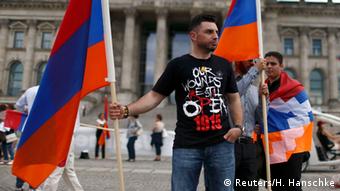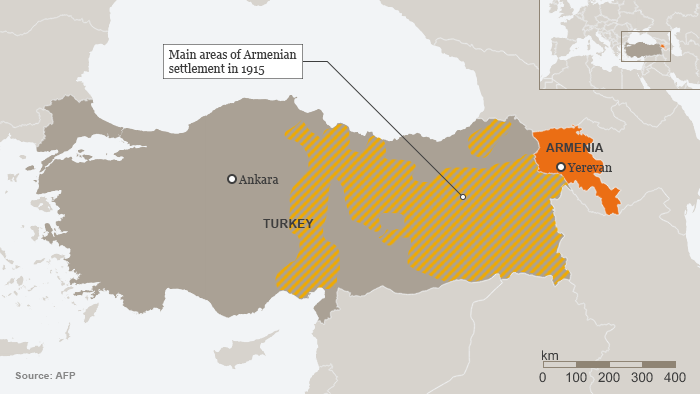Germany’s Bundestag passed a resolution qualifying the Ottoman Era Armenian killings ‘genocide’. The lower house of parliament voted almost unanimously, with one vote against the motion and one abstention. House speaker Norbert Lammert spoke of a “remarkable majority.”
German Chancellor Angela Merkel, Foreign Minister Frank-Walter Steinmeier, and the leader of the Socialdemocrats Sigmar Gabriel failed to attend the vote on account of other appointments. Critics have said, however, that they deliberately attempted to dodge a difficult vote.
Diplomatic row
The Turkish parliament, known as the Grand National Assembly of Turkey, issued a statement in cooperation with Turkey’s Commission for Foreign Affairs criticizing the draft resolution:
“We strongly condemn and reject this unlawful motion brought before the Bundestag, for which historical truths relating to the events of 1915 were deliberately distorted,” it read.
Turkish President Recep Tayyip Erdogan said ahead of the resolution that it could damage “diplomatic, economic, business, political and military ties” between the two countries – a sentiment later repeated by the spokesman of the ruling AK Party, which Erdogan founded.

However, it is unlikely that the passing of the resolution would actually put a dent to bilateral affairs, as there are no legal consequences associated with the vote. Turkey may, however, call in the German ambassador, as it has done in the past during other political disagreements, or recall its own ambassador to Berlin, as was the case in 2015 when Austria, Luxembourg and the Vatican passed similar resolutions with regards to the Armenian massacre.
Michael Brand, head of the parliamentary committee on human rights, stressed that he doubted Germany’s relationship with Turkey would suffer after the resolution:
“I can’t imagine that Turkey, which is currently finding itself isolated in its foreign policies in the face of mounting pressure from IS and the PKK, could afford to severe its ties with Germany – one of its most reliable partners,” he told reporters. “This isn’t about embarrassing Turkey but about articulating a historical truth. We cannot apply tact when it comes to the truth.”
German complicity
The co-leader of Germany’s Green party, Cem Özdemir, who also has a Turkish background, told reporters that Germany was even involved in the massacres 101 years ago, highlighting that the German Empire at the time provided the Ottoman Empire with the weapons needed to carry out such war crimes. Özdemir added that the German Empire had also sent military consultants, who supported and fought with the Ottomans.

“They knew exactly what was going on,” Özdemir said. “In this respect we’re guilty of complicity, and have to admit this.”
During the parliamentary hearing, Germany’s former Defense Minister Franz Josef Jung also admitted that the German Empire allowed for the events to happen and supported them quietly.
“Only those who recognize the past can take part in shaping the future,” he said. “We want this resolution to revive the process of reconciliation (between Turkey and Armenia).”
Both politicians also called on parliament to address another past massacre, this time actively carried by the German Empire. In what today is Namibia, up to 100,000 Herero and 10,000 Nama tribal people were reportedly killed under German colonial rule. The massacres took place between 1904 and 1907 and are commonly referred to as the first genocide of the 20th century.
A reflection of the state of affairs in Turkey
Özdemir and other parliamentarians also added during the debate ahead of the vote that current generations or Turks were not to be held guilty of the crimes, but responsible for remembering them – “in the same manner that Germans were responsible for remembering the events of the Holocaust.”
He also highlighted the fact that the question of the Armenian massacre was also a reflection of deteriorating freedom of expression in Turkey, affecting all levels of society – including parliamentarians:
“When I go home tonight I won’t be arrested or beaten. This isn’t true for my colleagues in Turkey fighting for Armenians.”
Consequences beyond diplomatic ties
Many representatives of Germany’s 1.5 million-strong Turkish population protested against the resolution on the streets of Berlin and elsewhere.
Murat Kayman, head of Germany’s Turkish-Islamic Union of Religious Institutions (DITIB), said that the resolution would not only affect relations between Berlin and Ankara but would also aggravate relations between Germans and Turks in Germany.
Jaklin Chatschadorian,chairman of Germany’s Central Council of Armenians, meanwhile said that the resolution would help the Armenian community in Germany and beyond.
“It will mean that we (descendants) can finally depart from having to continually justify ourselves and enable us to refer to the fact that the genocide is a recognized fact in Germany and in many other countries,” he said.
“This is a necessary reply to Turkey’s highly professional policy of denial.”
Key points of disagreement
One of the Turkish government’s objections, albeit only a technical issue, is the fact that “genocide” was only introduced as a term in international law by the United Nations in 1948 following the events the Holocaust, and was only made law in 1951. The mass murder of Armenians, however, predated the end of World War II by 30 years.
Turkey has repeatedly criticized the wording, claiming that the term ‘genocide’ conjured up images of the Holocaust and other industrial scale killings.
Another issue that Turkey disagrees with is the question of whether the deaths were premeditated. According to international law, however, the term “genocide” also includes the deliberate degeneration of living conditions for entire ethnic groups as well as their forced deportation and starvation, regardless of the result.
Turkey engaged in what historians call a meticulously planned resettlement policy of Armenians, whom they blamed for undermining the Ottoman Empire in its dying days at the height of World War I.
Turkey also questions the number of deaths, with official numbers varying from 800,000 to 1.5 million victims; qualifying for “genocide” under international law, however, does not take numbers into account.
http://www.dw.com/en/german-bundestag-passes-resolution-calling-ottoman-era-armenian-killings-genocide/a-19299936













